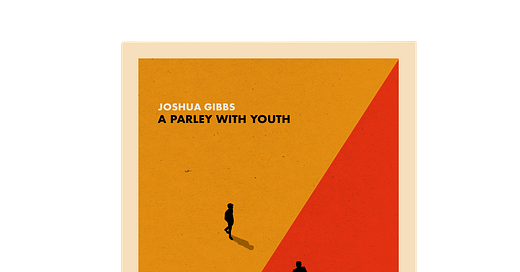As an Amazon Associate I earn from qualifying purchases
Gibbs, Joshua. A Parley with Youth: Dialogues with High School Students About Virtue. CiRCE Institute, 2024.
Bibliophiles have habits that are sometimes inexplicable. I, once a purist, read fiction cover to cover and non-fiction through every citation, never deviating even to discover the ending when my curiosity waned midway. I stayed the course. It is just how one reads a book, especially if one is a serious reader.
A book title with both virtue and parley in it seems serious yet whimsical. However, after reading one of Joshua Gibb’s earlier books, Something They Will Not Forget: A Handbook for Classical Teachers, I know he has a quick wit and will apply it with abandon to any topic, and yet, he is serious. After all, he was the man who wrote “A good classroom is an icon of the world, not an oasis from the world.” I was intrigued.
A Parley with Youth: Dialogues with High School Students About Virtue, reads more like a script since it is literally a collection of conversations. A purist would read it in a linear fashion and discover Gibbs’ purpose: “to give adults persuasive, philosophically sound, and psychologically realistic examples of talking with high school students.” However, I am no longer a reading purist, so I discovered his purpose after cavalierly opening the book to the chapter on video games and reading, “I simply don’t think having fun is very important.” What?
Some of you wise adults are nodding your heads in agreement, aren’t you? Especially if you are working Latin grammar in your head or solving calculus problems for fun. I suspected Gibbs is one of those teachers to whom fun is a waste of time, though wittiness was respected. A Shakespeare in twenty-first century garments. Did no one ever talk to him about becoming more engaging, or suggest using more interesting and interactive teaching methods? Was he never required to defend the serious classical book list to fun-loving and happiness-chasing parents? I assume so, knowing we have been rowing against the “fun” tide in recent years of educational experimentation. How can he have conversations with students and not like fun? How would they listen to him if he wasn’t fun? “What a piece of work is a man?” Indeed.
Each chapter of this non-fun book begins with a question or comment after which Gibbs leads the student in a Socratic discussion using logic as a lethal weapon. Oh, to be a fly on the wall! I confess to spending too much time pondering what the students were thinking before, during, and afterward. Each student wants something from Gibbs, sometimes approval, sometimes pushback, sometimes just to offload a burden. What each student received was a master class in respect, but also in not taking oneself too seriously, and in receiving a surprisingly honest answer. I don’t know what the students were expecting, but I bet they got their money’s worth. The questions are wide-ranging:
1. Why do you let your kids read the Harry Potter books? (Magic? Surely not!)
2. What do you think of video games? (The student likes them and tries to make an argument for video games increasing problem-solving abilities. Alas . . .)
3. What do you think? Should we baptize infants? (He goes there too and made me ask my own questions about loyalty to a church)
4. I am thinking about going to a public school next year . . . (If you have ever worked at a private Christian school, this question will be all too familiar.)
5. What do you think about students dating in high school? (To which Gibbs replies, “Why date? Why not just get married?” I like this guy!)
6. Why was the grade I got on this essay so low? (As a former English teacher at a Classical Christian school, I laughed aloud at Gibbs’ use of the adjective “unusual” when describing the essay).
These are familiar questions, aren’t they? If you teach and have good relationships with your students, you will answer these and the others in the book at some point in your career. I was thoroughly impressed with Gibbs’ answers, although I could never pull off his witty delivery. The students obviously know he cares about them, and I assume they trust him since the questions are sensitive and close to the heart of discipleship. They want to be taught by him. He obviously remembers his high school years and rightly recalls his own ignorance and confusion. This is why he is so incisive. Students deserve to have their questions taken seriously, if asked with serious intent. Frankly, one must be serious about students to hear the earnest questions amidst the unrelenting noise of our age.
Gibbs explains himself more thoroughly in the introduction:
Ours is a sentimental age, which means we are typically terrified of giving bad news or painful critiques (in person, at least), although a backlash against this sentimentality also prompts some to contrarianism, and so they believe the only honest form of communication is brazen, defiant, and rude. However, a conversation wherein seeking virtue is the goal does not grant ultimate priority to human feelings, but neither does it dismiss the importance which the heart must play in spiritual contentment. For this reason, a good conversation does not flatter either party, but neither does it senselessly demean the other. Rather, both partners finish the conversation with an accurate estimation of their own merits and responsibilities.
This type of conversation is sorely missing from modern discourse, particularly between teacher and student. We barely succeed with adult colleagues! Honestly, how delightful is a conversation where we begin in disagreement, but by frank and clever discussion we better understand our own mind and respect the other person for his willingness to stand the test? Is this not the height of friendship? When we invite students to practice their rhetorical skills concerning virtue, isn’t this a form of courage on both sides?
I finished the book thinking about my impressions of the students who asked the questions. They were curious and bright and yet willing to be both opponent and foil. It seemed almost like fun to them. Apparently, this type of repartee is its own type of fun. Touché, Sir Gibbs.
Tami Peterson is the Founder and CEO of Life Architects, a Dallas, Texas-based educational coaching and consulting firm that primarily supports families and institutions as they design innovative ways to instill confidence in the next generation as they explore opportunities for higher education and careers. She is a certified life, leadership, and career coach and has served classical schools as a teacher, guidance director, and curriculum designer. She graduated in 2021 from Regent College in Vancouver, BC with an MA in Leadership, Theology, and Society. You can see more of her work at www.lifearchitectscoaching.com.




